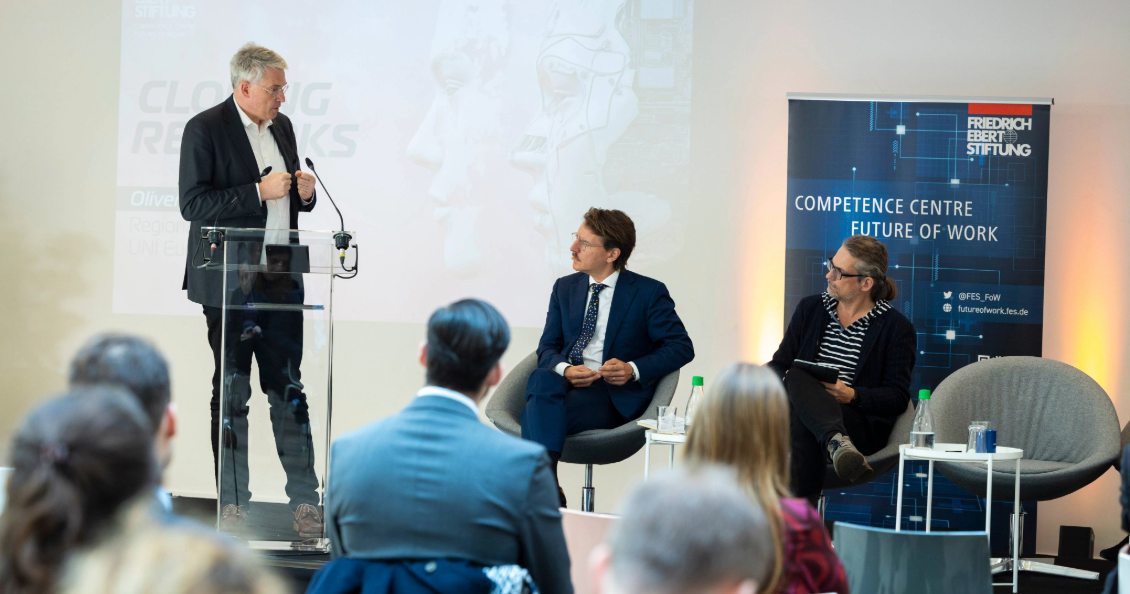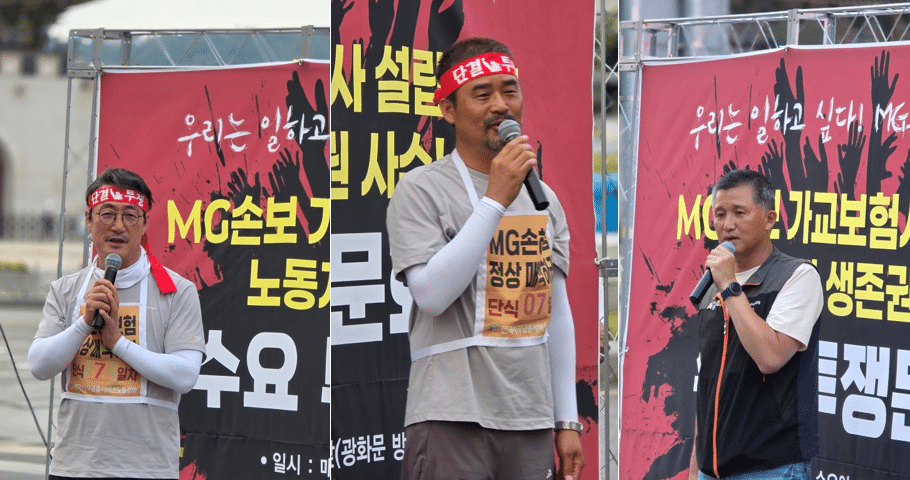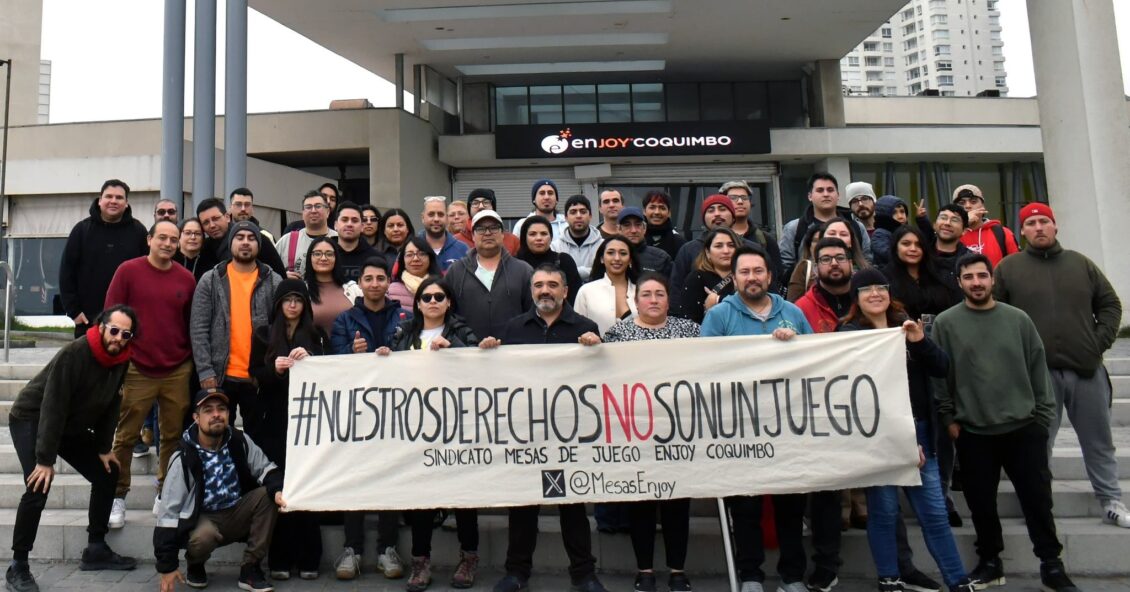How creative and cultural workers shape Generative AI
03.10.24
On 2 October 2024, at a joint FES-UNI Europa Conference on Artificial Intelligence, trade union leaders, experts and Members of European Parliament discussed how AI affects creative workers and the cultural sectors.
With AI technologies becoming increasingly integrated into work processes, from generating content to automating repetitive tasks, the conversation has shifted toward finding a balance between innovation and workers’ rights. On 2 October 2024, at a FES-UNI Europa conference on Artificial Intelligence, representatives from UNI, including leaders from affiliate Writers’ Guild of America, delivered a powerful message: whether AI enhances our work or strips it of its creative essence depends on workers’ ability to shape the terms of technology use through collective bargaining.
Opening the conference, Knut Dethlefsen, the new head of the FES Competence Centre on the Future of Work, posed the central question: “How can the technological progress of AI benefit those that do creative work – and allow for innovation without stifling freedom?” This sentiment reflects a broader anxiety about AI’s transformative power. While technological advances promise greater efficiency, there is growing concern that without proper safeguards, they could erode the rights of workers, particularly in cultural and creative industries.
Innovation without exploitation
The European Union is currently navigating this delicate balance through legislative frameworks like the AI Act, designed to regulate the use of AI technologies. Member of European Parliament Brando Benifei, one of the key speakers at the conference, expressed both optimism and caution about the future of AI in Europe. “If you look at the progress made by generative AI in the last two years, it’s incredible,” he said. “But we want to create good conditions for creative workers without obstructing innovation.”
Benifei emphasised that the stakes are high, particularly in terms of how AI might be used to exploit the work of creatives. He noted that member states have been lobbied heavily to water down the AI Act, and that the economic interest lies in using creative content to train AI systems. “There are already lobbying activities to make sure regulation in Europe of AI fails,” Benifei warned. “We need to ensure that the creative worker can be protected from harsh exploitation.”
Augmentation or displacement
The debate over AI’s impact is particularly intense in cultural and creative industries, which have been described as “ground zero” for the changes AI is bringing to the workplace. Daniel Mügge, a professor of political arithmetic, highlighted the shift in the conversation about AI.
“Today, we are no longer having a discussion about AI creating a jobless society through automation,” he said. “It is much more about the quality of work, the satisfaction that workers get from their work, the security workers feel.”
Mügge’s remarks resonate with many creatives who are grappling with how AI will affect their livelihoods. AI offers significant opportunities to offload repetitive tasks, allowing workers to focus on more creative endeavors. Johannes Studinger, head of UNI’s Media, Entertainment & Arts sector, underlined that AI should be used to augment human activity, not displace it.
“Creation is a human activity,” he stated. “It is not acceptable that AI displaces the products of authors and creatives.”
The potential for AI to streamline work processes and improve work-life balance is a key selling point for advocates. Studinger noted that unions are already negotiating how AI can be used to better plan productions, saving time and giving workers more flexibility. However, this optimism is tempered by fears of job degradation, loss of creative control, and exploitation of intellectual property.
Struggles and strikes
The growing concerns about AI’s potential misuse have already led to significant labour actions, most notably the 148-day strike by US writers organised in the Writers Guild of America (WGA). The WGA strike, which lasted 148 days, brought solidarity from across the labour movement, with UNI organising support in Europe and beyond as well as helping coordinate a global day of action. Ellen Stutzman, the former chief negotiator for the WGA and now Executive Director of WGA-West, shared insights from the recent strike, which demonstrated the power of collective action. “When we went into negotiations with producers, they were stone-walling,” Stutzman recounted. “It was only until the strike that they came back to the negotiating table.”
A key issue in the strike was the role of AI in content creation. Stutzman emphasised that the WGA succeeded in defining AI’s role as research, not writing. “AI isn’t writing,” she said, underscoring the need for transparency and compensation when AI uses the work of human creatives to train its algorithms. “There needs to be affirmative consent and transparency,” she added.
Stutzman’s experience underscores a broader concern within the creative industries: AI’s ability to mine past creations without proper compensation or consent. Frédéric Young, executive director of the Society of Dramatic Authors and Composers Belgium, called this practice “the big steal,” referring to the dual exploitation of past and present human creativity.
Legislative and policy responses
As AI continues to evolve, legislators and policymakers are grappling with how to protect creative workers. Paul Keller, director of policy at Open Future, pointed out that current legislation, such as the Copyright Directive and the AI Act, lacks provisions for remuneration for creative workers whose content is used to train AI systems. Alexandra Geese, a Member of the European Parliament, echoed this concern, emphasising the need for Europe to build its own technological capacities to maintain sovereignty over its digital infrastructure. “A dysfunctional market endangers cultural diversity – a problem AI intensifies,” she warned.
Benifei and other policymakers see the AI Act as a critical tool for ensuring that AI serves the interests of workers, not just corporations. However, they face significant challenges from lobbying efforts and the immense economic interests at play. “The pressure is very high,” Benifei admitted, noting that prime ministers across Europe have been lobbied to dilute the AI Act.
Oliver Roethig, UNI Europa Regional Secretary, echoed the sentiment that AI is not a new challenge but part of a continuous process of technological evolution. “Trade unions and workers are not against the future and change – we have to shape it,” Roethig said. He emphasised that the focus must be on how the productivity gains from AI are distributed between creative workers, producers, and investors. “We are talking about managing transformation,” he added, calling for frameworks that empower workers through collective bargaining. Roethig pointed to examples from the US, like the WGA’s negotiations, as models feeding into how European unions are addressing AI in their bargaining efforts. By drawing on these collective strategies, unions can play a crucial role in ensuring that AI-driven productivity enhances workers’ rights rather than eroding them.


